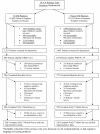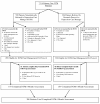Implementing collaborative care for depression treatment in primary care: a cluster randomized evaluation of a quality improvement practice redesign
- PMID: 22032247
- PMCID: PMC3219630
- DOI: 10.1186/1748-5908-6-121
Implementing collaborative care for depression treatment in primary care: a cluster randomized evaluation of a quality improvement practice redesign
Abstract
Background: Meta-analyses show collaborative care models (CCMs) with nurse care management are effective for improving primary care for depression. This study aimed to develop CCM approaches that could be sustained and spread within Veterans Affairs (VA). Evidence-based quality improvement (EBQI) uses QI approaches within a research/clinical partnership to redesign care. The study used EBQI methods for CCM redesign, tested the effectiveness of the locally adapted model as implemented, and assessed the contextual factors shaping intervention effectiveness.
Methods: The study intervention is EBQI as applied to CCM implementation. The study uses a cluster randomized design as a formative evaluation tool to test and improve the effectiveness of the redesign process, with seven intervention and three non-intervention VA primary care practices in five different states. The primary study outcome is patient antidepressant use. The context evaluation is descriptive and uses subgroup analysis. The primary context evaluation measure is naturalistic primary care clinician (PCC) predilection to adopt CCM.For the randomized evaluation, trained telephone research interviewers enrolled consecutive primary care patients with major depression in the evaluation, referred enrolled patients in intervention practices to the implemented CCM, and re-surveyed at seven months.
Results: Interviewers enrolled 288 CCM site and 258 non-CCM site patients. Enrolled intervention site patients were more likely to receive appropriate antidepressant care (66% versus 43%, p = 0.01), but showed no significant difference in symptom improvement compared to usual care. In terms of context, only 40% of enrolled patients received complete care management per protocol. PCC predilection to adopt CCM had substantial effects on patient participation, with patients belonging to early adopter clinicians completing adequate care manager follow-up significantly more often than patients of clinicians with low predilection to adopt CCM (74% versus 48%%, p = 0.003).
Conclusions: Depression CCM designed and implemented by primary care practices using EBQI improved antidepressant initiation. Combining QI methods with a randomized evaluation proved challenging, but enabled new insights into the process of translating research-based CCM into practice. Future research on the effects of PCC attitudes and skills on CCM results, as well as on enhancing the link between improved antidepressant use and symptom outcomes, is needed.
Trial registration: ClinicalTrials.gov: NCT00105820.
Figures
References
-
- Mintz J. et al.Treatments of depression and the functional capacity to work. Arch Gen Psychiatry. 1992;49(10):761–8. - PubMed
Publication types
MeSH terms
Associated data
LinkOut - more resources
Full Text Sources
Medical



